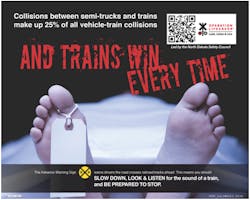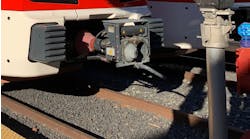Operation Lifesaver, Inc. (OLI), in partnership with the Federal Railroad Administration (FRA), announced more than $200,000 in grants to 12 State Operation Lifesaver programs for a variety of rail crossing safety and anti-trespassing public education projects and public service announcements around the country.
Operation Lifesaver organizations in Alaska, Georgia, Louisiana, Maine, Missouri, North Carolina, North Dakota, Ohio, Oregon, South Carolina, Utah and Wisconsin will use the grants to establish programs and broadcast public safety messages on television, radio and in movie theatres; erect billboards on distracted driving; target outdoor sportsman and Spanish-language speakers and create new rail safety products and presentations.
“Our OLI state coordinators proposed some very exciting initiatives to help further Operation Lifesaver’s mission of eliminating collisions, injuries and deaths at crossings and along rail property,” said Joyce Rose, OLI’s president and CEO. “These projects will go a long way toward increasing the number of eyes and ears that receive our message. When you see one, tweet us at @olinational. We want to hear from you.”
The Federal Railroad Administration, a national partner and advisor of Operation Lifesaver, provides the funding for these grants.
“Safety is our highest priority,” said Joseph C. Szabo, Federal Railroad Administrator. “While the number of grade crossing incidents over the last decade decreased by nearly 34 percent nationally, fatalities at high-way rail crossing and trespassing continue to constitute a 95 percent of all rail-related deaths. The FRA is committed to working with our partner Operation Lifesaver to continuously improve safety at highway-rail grade crossings.”
Examples of the projects funded by the FRA grants include:
• Four Operation Lifesaver programs, in Georgia, South Carolina, North Carolina and Ohio, banded together to place billboards along highways near major rail corridors that caution drivers against using any electronic devices while driving. This behavior is often a major factor in vehicle-train collisions. The billboards will supplement radio public service announcements (PSAs), buttressing the rail safety message.
• Louisiana’s sugarcane season is in full swing, and the state’s Operation Lifesaver program has developed PSAs, publications, signage and presentations aimed at farmers, truck drivers, and mill workers involved in the sugarcane harvest, to heighten awareness of railroad crossing hazards and the dangers of trespassing on railroad tracks.
• Utah Operation Lifesaver partnered with its state Division of Natural Resources to purchase ad space in publications targeting hunters, fishermen and recreational vehicles drivers. North Dakota Operation Lifesaver, now contending with booming commercial truck traffic due to oil extraction from Bakken shale, will use graphic images and messages in a variety of formats targeting professional truck drivers.
• Some projects target younger audiences, such as in Maine, which will provide middle school students with rail safety puzzles. Others, such as in Oregon, will ensure that the large Latino community hears the rail safety message on Willamette Valley’s Spanish-language radio station.
The 17 approved grants were awarded through a competitive process. Selections were made by a panel of railroad safety experts using criteria such as successfully leveraging the federal funds with private partnerships, targeted messaging and the ability of the program to quickly roll out an initiative over the summer.
Operation Lifesaver plans to announce the results of a similar grant program for rail transit safety education projects in early August.

